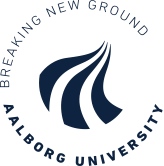Lecturers:
Dong Yu,
Principal Researcher, Microsoft Research, Redmond WA, USA,
http://research.microsoft.com/en-us/people/dongyu/
Zheng-Hua Tan,
Associate Professor, Aalborg University, Denmark
ECTS: 1
Period/time:
Spring 2015
Place: Aalborg
University
Thu. September 3 in the afternoon :
13:00-16:00 Frb 7A/4-108
Fri September 4 the whole day:
09:00-12:00 Frb 7C/2-209
13:00-16:00 Frb 7B/2-107
Description: Deep
learning is a newly emerged area of research in
machine learning and has recently shown huge success in a variety of
areas. The impact on many applications is revolutionary, which ignites
intensive studies of this topic.
During the past
few decades, the prevalent machine learning methods,
including support vector machines, conditional random fields, hidden
Markov models, and one-hidden-layer multi-layer perceptron, have found
a broad range of applications. While being effective in solving simple
or well-constrained problems, these methods have one drawback in
common, namely they all have shallow architectures. They in general
have no more than one or two layers of nonlinear feature
transformations, which limits their performance on many real world
applications.
On the contrary,
the human brain and its cognitive process, being far
more complicated, have deep architectures that are organized into many
hierarchical layers. The information gets more abstract while going up
along the hierarchy. Interests in using deep architectures were
reignited in 2006 when a deep belief network was shown to be trained
well. Since then deep learning methods and applications have witnessed
unprecedented success.
This course will
give an introduction to deep learning both by
presenting valuable methods and by addressing specific applications.
This course covers both theory and practices for deep learning. Topics
will include
•
Machine learning fundamentals
•
Deep learning concepts
•
Deep learning methods including deep autoencoders, deep neural
networks, recurrent neural networks, long short-term memory recurrent
networks, and computational networks.
•
Selected applications of deep learning
•
Software and tools
Prerequisites:
Basic probability and statistics theory, linear algebra and machine
learning.
Literature:
Li Deng and Dong
Yu, Deep Learning: Methods and Applications, Now publishing, 2014.
Dong Yu and Li Deng, Automatic Speech Recognition - A Deep Learning Approach, Springer, 2014.
 Deep Learning (Ph.D. Course)
Deep Learning (Ph.D. Course)